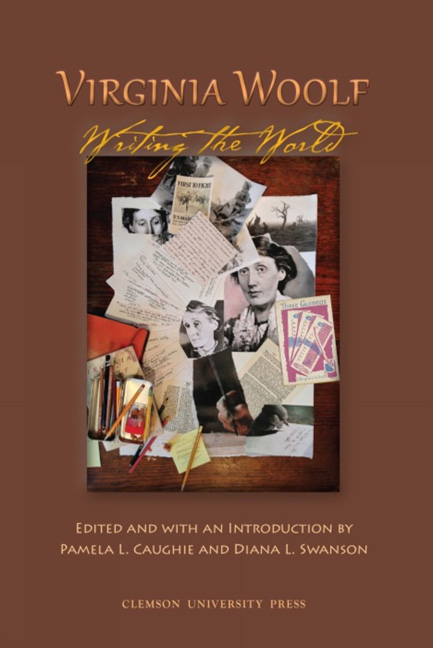Book contents
- Frontmatter
- Table of Contents
- Introduction
- Acknowledgmen
- Abbreviation
- WAR AND PEACE
- WORLD WRITER(S)
- Teaching Privileges: Three Guineas and the Cost of Global Citizenship
- From Guineas to Riyals: Teaching Woolf in the Middle East
- Fashionable Misconceptions: The Creation of the East in Virginia Woolf's Orlando
- From London to Taipei: Writing the Past in “Wandering in the Garden, Waking from a Dream” and Mrs. Dalloway
- An Estranged Intimacy with the World: The Postcolonial Woolf's Planetary Love in The Voyage Out
- “Shakespeare's Sister”: Woolf in the World Before A Room of One's Own
- Leonard Woolf: Writing the World of Palestine, Zionism, and the State of Israel
- ANIMAL AND NATURAL WORLD
- WRITING AND WORLDMAKING
- Notes on Contributors
- Conference Program
- Appendix: Virginia Woolf Conference Exhibit Items, Newberry Library
An Estranged Intimacy with the World: The Postcolonial Woolf's Planetary Love in The Voyage Out
from WORLD WRITER(S)
- Frontmatter
- Table of Contents
- Introduction
- Acknowledgmen
- Abbreviation
- WAR AND PEACE
- WORLD WRITER(S)
- Teaching Privileges: Three Guineas and the Cost of Global Citizenship
- From Guineas to Riyals: Teaching Woolf in the Middle East
- Fashionable Misconceptions: The Creation of the East in Virginia Woolf's Orlando
- From London to Taipei: Writing the Past in “Wandering in the Garden, Waking from a Dream” and Mrs. Dalloway
- An Estranged Intimacy with the World: The Postcolonial Woolf's Planetary Love in The Voyage Out
- “Shakespeare's Sister”: Woolf in the World Before A Room of One's Own
- Leonard Woolf: Writing the World of Palestine, Zionism, and the State of Israel
- ANIMAL AND NATURAL WORLD
- WRITING AND WORLDMAKING
- Notes on Contributors
- Conference Program
- Appendix: Virginia Woolf Conference Exhibit Items, Newberry Library
Summary
What does Virginia Woolf, a canonical English modernist writer, have to do with the postcolonial? Doesn't the juxtaposition of Woolf and the postcolonial sound out of place? Is it appropriate to make up such an awkward phrase as the “postcolonial Woolf”? While general readers of Virginia Woolf might feel confused about the combination of Woolf and the postcolonial, many thematics in postcolonial studies—nation, imperialism, race, etc.—have been frequently discussed in Woolf studies, often along with a feminist or poststructuralist reading. Indeed, as evidenced by an increasing body of Woolf scholarship on the relationship between Woolf and British cultural imperialism, motivated by the emblematic debate between Jane Marcus and Patrick McGee, it is fair to say that (post/ anti)coloniality is actually essential to the cultural politics of Woolf criticism. Despite the intimacy between Woolf and the postcolonial, however, when we leave out the conjunction to create the term “postcolonial Woolf,” this awkward phrase at once elicits not only an estrangement or an intimacy but an “estranged intimacy” that foregrounds a tension in this unusual combination. Building upon this disciplinary “estranged intimacy” evoked by the term “postcolonial Woolf,” in what follows I focus on Woolf's first novel The Voyage Out (1915). I argue that the protagonist Rachel's reading and exploration of life embody an “estranged intimacy with the world” that informs an ethical imagination of our being-in-the-world and an ethical reading of others that can be set against a narrative of triumphalism in this explicitly “colonial” novel. In so doing, I hope to open up new possibilities of reading Woolf through a postcolonial lens in response to the recent call for an ethical (re)turn in postcolonial studies.
As a Bildungsroman, Woolf's first novel describes Rachel's journey to South America and her parallel rite of passage in which her quest for knowledge and her desire to “see life” are accompanied not only by people she encounters but also by the books suggested by these “mentors.” Full of intertextual references and book titles, the novel foregrounds reading as a trope for Rachel's initiation into the social order and her cultivation of normative values. Rachel's “voyage in” the world of books and her reaction to those mentors become the crucial elements if we intend to tease out the significance of Rachel's reading.
- Type
- Chapter
- Information
- Virginia Woolf: Writing the World , pp. 116 - 121Publisher: Liverpool University PressPrint publication year: 2015

